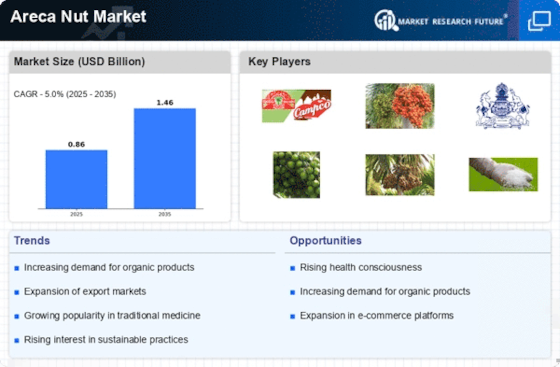Top Industry Leaders in the Areca Nut Market

Strategies Adopted by Areca Nut Key Players
Core strategies encompass ensuring product traceability, engaging in sustainable farming practices, and fostering relationships with both domestic and international buyers. Market share analysis in the areca nut industry is influenced by factors including product quality, geographical presence, and compliance with regulatory standards. The geographical origin and the cultivation method of areca nuts play a pivotal role in determining market competitiveness.
As the areca nut market evolves, new and emerging companies are making their mark, contributing to the competitive landscape with innovation and differentiation. Start-ups like Green Agro Exports and Kalki Nuts are leveraging technology for efficient farm management, enhancing product traceability, and establishing direct connections with buyers. These companies often prioritize sustainable and organic farming practices to align with the growing consumer demand for ethically sourced and environmentally friendly products. The industry is witnessing a rise in the adoption of technology for improved cultivation practices, reflecting an effort to enhance yield, quality, and efficiency.
Industry news within the areca nut market reflects ongoing trends, market dynamics, and factors influencing the supply chain. News related to weather conditions, crop diseases, and government policies affecting areca nut cultivation often make headlines, highlighting the inherent susceptibility of the industry to external factors. Additionally, trade agreements and international market trends play a significant role in shaping industry news, reflecting the interconnected nature of the areca nut market. The industry also responds to evolving consumer preferences, with news covering topics such as product diversification, value addition, and efforts to address health concerns associated with areca nut consumption.
Current investment trends in the areca nut industry underscore a dual focus on sustainable farming practices and technology adoption. Key players are directing investments towards research and development of disease-resistant varieties, crop management technologies, and sustainable cultivation methods. Investments in modernizing processing facilities and enhancing product packaging align with market demands for quality and hygiene. Moreover, companies are exploring opportunities for vertical integration, investing in plantations to secure a consistent supply chain and improve cost efficiency.
The overall competitive scenario in the areca nut market is characterized by established players and new entrants alike, each navigating the industry with distinct strategies. Market share analysis is multifaceted, encompassing considerations such as product quality, geographical origin, and compliance with regulatory standards. Given the significance of areca nuts in various cultural practices, the industry also encounters socio-cultural factors that impact market dynamics. The ability to adapt to changing climatic conditions, adhere to sustainable practices, and meet quality standards remains crucial for sustained competitiveness. As consumer awareness regarding ethical sourcing and environmental impact grows, the areca nut industry is poised for continuous evolution, with companies seeking to strike a balance between tradition and innovation.
In conclusion, the areca nut market's competitiveness is driven by a mix of traditional practices and modern approaches. Key players are strategically positioning themselves through measures like quality assurance, sustainable farming, and adherence to regulations. New entrants are leveraging technology and sustainability to carve out their niche. Industry news reflects the dynamic nature of the areca nut market, responding to external factors and evolving consumer preferences. Current investment trends emphasize the importance of technology adoption, sustainable practices, and vertical integration. The overall competitive scenario underscores the need for adaptability, quality assurance, and a nuanced understanding of the multifaceted factors influencing the areca nut market.
Industry News and Investment Landscape:
- A trend toward responsible production is indicated by recent government measures supporting sustainable practices and organic farming in important producing regions.
- A emphasis on future diversification is shown by increased investments in research & development, which include investigating pharmaceutical and nutraceutical applications.
- Market expansion and changing consumption habits are facilitated by the increasing influence of social media and the endorsements of celebrities in traditional consuming regions.
Key Companies in the Areca Nut Market Include –
- RUBY PRIVATINDO
- SRI VINAYAKA BETELNUT TRADERS
- THE CAMPCO LTD.
- GM GROUP
- SWASTIKA INTERNATIONAL
- SHRI GANESH PRASAD TRADERS
- VIETDELTA INDUSTRIAL CO., LTD











